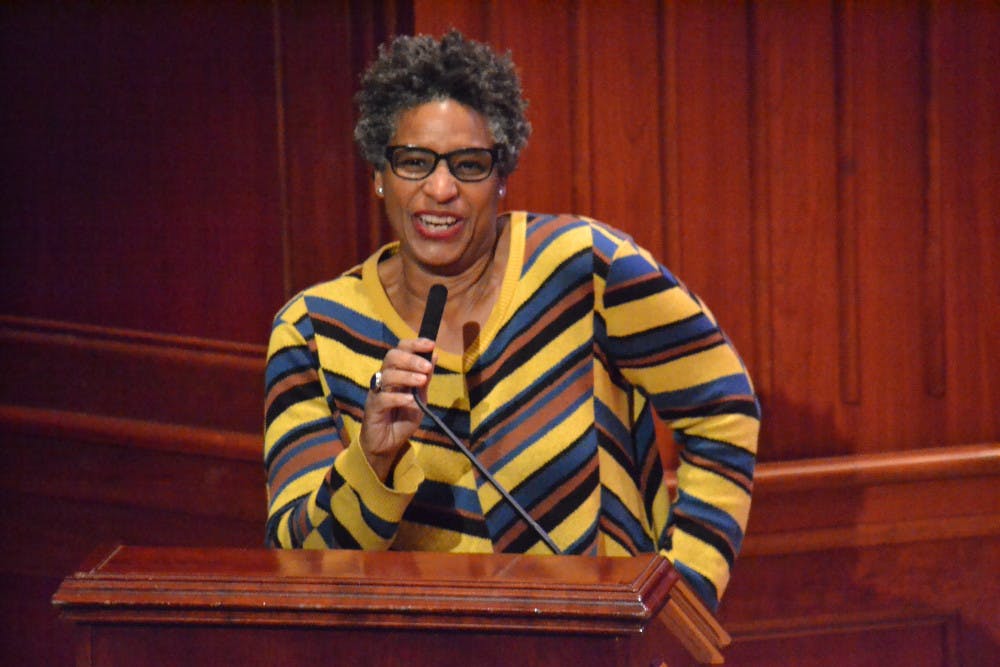By Diana Solano
Correspondent
New York University professor Yvonne Latty spoke on Friday, March 3, at the College’s final Brown Bag lecture of the spring 2018 semester.
Latty’s career began in film school at NYU where she studied photography, print journalism, podcasting and teaching. She expressed how proud she was of her background and upbringing.
“I will always think of myself as a girl from 108 St., Apartment 5, hanging out of the second-floor window looking at all the drama happening in the neighborhood,” Latty said.
She spoke on her life growing up in Harlem, where harrowing scenes occurred on a regular basis. When the media visited her neighborhood, they portrayed a negative image of the community, ignoring their perspectives by not interviewing them about the crimes being committed.
“They looked at us like monsters — a freak show,” Latty said. “The people of the inner city … so scary, look how they all kill each other.”
Latty knew her community was not as the media described. Her mother immigrated to the U.S. from the Dominican Republic, and her father was sent to the U.S. from Jamaica when he was 2 years old. Latty said her mother dreamed of moving to the U.S. and seeing what she thought would be streets made of gold.
Due to her parents’ hard work, Latty was able to attend Mother Cabrini High School, which led her to study film at NYU and the opportunity to leave 108th Street.
Latty was unable to get a job after graduating, since the film industry lacked diversity and white men held most of the positions, according to Latty. This discouragement led her to become a fashion photographer in Europe.
While she was hesitant to break into the field of journalism, she eventually returned to NYU, applied to graduate school to study journalism and became a print reporter at the Philadelphia Daily News.
Holding on to the desire to tell the stories of the people from the inner city, she reported on shootings and robberies.
While working in Philadelphia, a call from a stranger led her to tell the story of George, an African-American World War II veteran. He worked as a waiter in a submarine, but when under attack, he would have to take on a station like any other soldier to help defend the craft.
“George saved people’s lives and was a hero, but didn’t get any recognition,” Latty said.
Inspired by George’s story, Latty wrote, “We Were There,” a book with short stories told in the first person perspective of African-American veterans.
Later in her career, she presented an award-winning documentary that she directed and produced, “Sacred Poison,” which shed light on the negative health effects of water contamination near a Navajo tribe.
“No one talks about it,” Latty said. “Being a journalist and storyteller, this is what motivates me and drives me to tell stories.”
Latty spoke of wanting to create a chain effect in which people see her work and want to help people who can’t help themselves.
She credited her successful career to the education she was able to receive, unlike others in her community.
“In my heart, it’s what I wanted to do,” Latty said. “I have the opportunities. I had to push through because of what my mother did coming from the Dominican Republic to America.”
Ashley Urena, a freshman psychology major, viewed Latty as an inspiration.
“I’m Dominican too, and her presentation showed the power of a good education, and most importantly, what you can do with the education to help others,” Urena said. “She held onto her community instead of forgetting them like the media did to her.”
Latty plans to continue giving a voice to the voiceless. She is currently working on a book proposal for Alzheimer’s disease in honor of her mother who was diagnosed with the condition. Latty said that everyone knows someone who is affected by this illness, shedding light on yet another prevalent, yet underreported topic.







